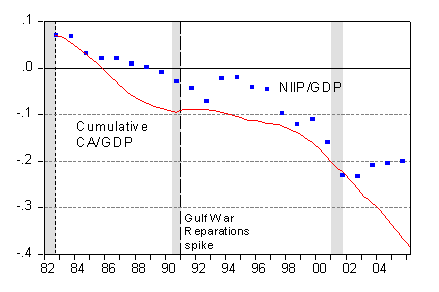“Dark Matter”, like all stories about free lunches, still excites lots of people’s imagination, as evidenced by the reaction to my post on the subject a week ago. Here is one picture that should further temper the excitement.

Figure 1: Net International Investment Position, end-year (blue squares), and Cumulative Current Account balance on a NIPA basis (red line), as a ratio to GDP. NBER recession dates in gray shading. Sources: BEA International Investment Position release of June 2006, BEA NIPA release of October 2006, NBER, and author’s calculations.
The cumulative current account figures are based on the NIPA definition of the current account, and is set to equal the BEA’s reported Net International Investment Position (NIIP) at end 1982.
Interestingly, the NIIP has levitated above the old-fashioned measure, the cumulative current account, for long stretches of time, only to fall down to the red line every few years. The last time this occurred was during the last recession. The NIIP also reverted to the cumulated CA line a couple years after the recession that occurred during the term of G.H.W. Bush; my back of the envelope calculation (based on Figure 1 in my previous “dark matter” post) suggests that the additional levitation in 1992-93 can mechanically be ascribed to the Gulf War Reparations; these were roughly equal to 0.23 ppts of GDP in 1991q1 and 1991q2.
With this perspective, it is clear why “dark matter” has been the focus of so much attention in the past half decade — the deviation of NIIP/GDP from cumulative current account/GDP ratio is unprecedented, with the earlier gaps never exceeding 10% of GDP. What will be interesting to see is if the NIIP/GDP series reverts to the cumulative current account series, as it has in the past.
Of course, many factors affect the NIIP/GDP series — most importantly exchange rate changes and equity market developments. For instance, the surprising stability of the NIIP/GDP series in 2005 was the result of a boom in European equities. A resurgent U.S. equity market in 2006 might be expected to have a reverse impact, although exchange rate changes — the dollar has depreciated against the euro so far– will tend to offset that effect.
Technorati Tags: Net International Investment Position,
dark matter,
cumulated current account,
exchange rates
Dr. Chinn: We owe one to the late Milton Friedman for TANSTAAFL. While I am not exactly a true follower of his, credit should be given where credit is due.
I am certain that foreign exchange and equity market performance do affect this disparity as well as other factors (the valuation component). Yet, my first instinct would be to think that perhaps the prescribed method of recording BOP data needs revising if discrepancies are growing larger over time.
I am doing some work on this matter, strangely enough for a political science major. When I have more time, I intend to go through the official 1993 IMF BOP Manual. The answer to this discrepancy must partly lie in there somewhere. It probably needs a bit of updating since they haven’t revised it in over a decade!
Emmanuel: Interestingly, Wikipedia gives credit to SF writer Robert Heinlein, which if you are familiar with his pre-Stranger in a strange land writings, makes perfect sense. Wikipedia gives credit to M. Friedman for popularizing the phrase.
You’re going to study BPM5? Best of luck. I think the point is valuation issues such as accounting for intangibles may be part of the discrepancy, but not the major. I’m for the more prosaic interpretation of the deviations as due to asset price and exchange rate fluctuations.
I’m thinking Heinlein as well, but I remember it as being from The Moon’s a Harsh Mistress (1966, iirc), which certainly postdates Stranger (1961 or 1962).
Leave it to a former Upton Sinclair candidate to be co-opted.
Of course, if this had been Dr. Hamilton’s post, it would have credited Bob Dylan, or possibly George Alec Effinger.
Ken Houghton: I stand corrected. You are absolutely right. I knew I should not have trusted my memory.